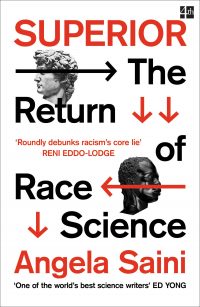If we truly want an end to racism, we need to understand the past
 Superior: the Return of Race Science
Superior: the Return of Race Science
by Angela Saini
Saini, an engineer-turned-journalist, looks at how science was and is used to create, justify and perpetuate racism. She begins with the so-called science that defined race in the first place – using long-since discredited methods such as phrenology and skin-colour charts. The more you read about how people have been grouped differently over time, and the political reasons for the changing delineations between “races”, the more clear it becomes that race is an entirely social construct, not a scientific one.
But of course race became a social reality, one that has been used to justify a lot of very dodgy science. From European explorer scientists publishing ignorant untruths about native people they encountered to justify colonialism and slavery, to the ugly history of eugenics, there have now been centuries of racist lies masquerading as science. And worse, the lies still need to be countered because they are still part of public discourse.
In what for me was the scariest part of this book, Saini follows the money to figure out how and why academic journals still exist dedicated to publishing racist pseudoscience. Studies that no science funding organisation would dream of supporting are somehow still getting financed, and the authors of those studies are reviewing and citing each other, giving the whole field an air of legitimacy. Where is the money coming from? White supremacists.
“Trying to force a biological understanding of race fails, often spectacularly, for the simple reason that it’s history that has the answers…If we truly want an end to racism, we need to understand the past, to have more equitable education and healthcare, to end discrimination in work and institutions, to be a little more open with our hearts and maybe also with our borders.”
Saini briefly covers how social science on the very real differences between the lived experiences of people with different skin colours is fraught with problems – not least because far too many studies begin with an assumption of biological difference rather than sociocultural.
And she also burst my bubble about those home DNA kits such as 23andme – genetics is far more complicated than I was taught at school, and in a science based largely on possibilities, a test that only looks for specific things (a list that differs between all the various private firms that offer these tests) really can’t tell each individual much that is definite.
We are each the product of almost infinite possibilities biologically speaking. The fact that many of our life outcomes can be predicted from birth is the social construct we live in.
Published 2019 by HarperCollins.
Source: ebook was made available free by the publisher for the first week of June.